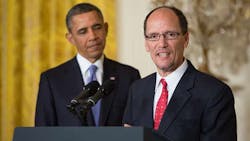Perez Nomination Raises Ethical Quandary for Looming Labor Rule Set to Invade Business Confidentiality
President Obama’s selection of Thomas Perez to be the next secretary of labor raises some ironic ethical considerations. If confirmed, Perez will be charged with interpreting and enforcing the imminent final “persuader” regulations. Perez himself has been charged with some ethically questionable behavior while at the helm of the Department of Justice’s Civil Rights Division. The proposed persuader regulations, discussed below, generate their own ethical problems. Unless the final regulations deviate substantially from the proposal -- which is doubtful -- they will inevitably place employers and their labor counsel in an ethical quandary: violate client confidentiality or face criminal charges. The question, therefore, is whether an ethically problematic rule should be enforced and interpreted by an ethically problematic nominee?
Persuader Regulations
Issued in June 2011, the proposed regulations would amend the employer and consultant reporting requirements under the Labor Management Reporting and Disclosure Act (LMRDA) of “persuader activity.” The DOL proposes to significantly broaden the scope of reportable activities by substantially narrowing its interpretation of the “advice exemption” in Section 203(c) of the LMRDA, as well as by expanding what constitutes “persuasion.” The practical effect of this proposal is to significantly constrain the relationship between an employer and its counsel, as the rule would require all employers who reach out to law firms for “advice” on labor matters to report to the government the nature of the relationship with the firm, the fees paid and the category in which the “advice” falls. Lawyers would have the same obligation to report these matters. Parties face criminal penalties -- including potential jail time -- for noncompliance. The practical effect of this rule would be to limit the ability of employers to obtain legal counsel during union organizing, essentially “chilling” the company's ability to communicate effectively with its employees about unionization without fear of violating the law. Small employers that cannot afford in-house attorneys will be hit especially hard by this rule.
At the same time, lawyers have an ethical obligation under the American Bar Association’s Model Rule 1.6 to maintain client confidentiality. Therefore, attorneys may be forced to choose between complying with the DOL’s expanded reporting requirements, thereby violating their ethical duty of confidentiality towards their clients, or facing criminal sanctions.
Perez Ethical Questions
As noted earlier, Perez faces his own ethics charges. In Magner v. Gallagher, the city of St. Paul, Minn., challenged the use of statistics as evidence of race discrimination under the Fair Housing Act (FHA). The DOJ was reportedly concerned that the U.S. Supreme Court would strike down this practice and find that disparate impact claims are not cognizable under the FHA, so it allegedly encouraged the city to withdraw its lawsuit. In exchange, according to the accusations, the DOJ would decline to intervene in an unrelated False Claims Act (FCA) lawsuit brought by a private whistleblower against the city of St. Paul. The whistleblower claimed the city violated the FCA by falsely certifying that it was using federal funds to create jobs for low income workers of all races, when the programs were allegedly focusing only on minority employment. A scathing Wall Street Journal article provides further details of Perez’s alleged involvement in this deal.
This purported quid pro quo arrangement generated a Congressional outcry in September 2012. Sen. David Vitter (R-LA) has already announced that he plans to block Perez’s nomination for this and other reasons.
Moreover, in the days leading up to Perez’s nomination, the Inspector General released a report charging that the DOJ’s Civil Rights Division -- run by Perez -- suffers from a “disappointing lack of professionalism,” among other issues.
An ethically problematic labor regulation should be enforced and interpreted by a labor secretary who is above reproach. The upcoming confirmation hearings will hopefully shed some light on whether Perez meets this standard, and how he would handle the inherent conflict presented by the persuader rule, among other DOL regulations.
Michael Lotito is an employment and labor law attorney representing the labor interests of numerous Fortune 100 companies and has testified repeatedly before Congress and the Equal Employment Opportunity Commission on regulatory and legislative matters.
